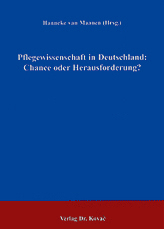
Hanneke van Maanen (Hrsg.)Pflegewissenschaft in Deutschland: Chance oder Herausforderung?
Schriften zur Pflegewissenschaft, volume 1
Hamburg 2003, 108 pages
ISBN 978-3-8300-1066-1 (print)
About this book deutschenglish
Nursing education in Germany is based at hospital-schools of nursing, working under the legislation and guidelines of the Ministry of Health. Post-basic courses in nursing management and nursing education have traditionally been offered by (semi)private institutions, frequently in affiliation with healthcare facilities. After years of strenuous efforts, the discipline of nursing - recognizing the need to prepare nurses at a professional level - has succeeded in gaining access to the system of higher education. This promotion enabled post-basic programmes for nurse-teachers and nurse-managers to be transferred to universities and polytechnic institutions. The inclusion of post-basic nursing studies into the system of higher education regulates the accreditation of diplomas (degrees) under the jurisdiction of the Ministry of Education, which strengthens the position of the "graduate" nurse. Whereas other industrialized nations moved basic nursing education into the system of higher education a few decades ago and structured this "upward mobility" by educational phases, the German nursing discipline seems to be taking an abridged programme. Nursing-faculty and students of advanced diploma (degree) programmes are facing tremendous challenges in moving the discipline from an occupational to a professional level. A ministerial decree recommended offering post-basic programmes for nurse-managers at polytechnic institutions and for nurse-educators at universities, which were in some case enriched by a pre-academic "bridge" programme. The development of this educational transition reaches as far back as to the early nineties. "Nursing Science in Germany: Chance or Challenge?" deals with the development of practice-orientated nursing in hospitals to university-based nursing science. The details which characterize nursing and the science of nursing are being discussed within the framework of the professionalization of a practice-discipline through its development towards nursing science and nursing scholarship. The presentation of professional nursing as a science- and research-based discipline is elaborated by models and examples. Nurse-scientists with international experience in the development of advanced nursing education and educational research have contributed their expertise to this publication. The first paper deals with the broader scope of nursing in connection with the Standing Committee of Nurses of the European Union (PCN), which is the professional advisory platform for the socio-political development of nursing education in the EU countries. The PCN recommendations are supported by nursing research as provided by the Workgroup of European Nurse-Researchers (WENR). Moving away from the international scene, the attention is then directed towards the situation in Germany. The second contribution centres around the challenges facing the current system of nursing education in its transition from job-oriented training towards professional education. This is not only a matter of legislation and politics, but also of disciplinary aims with regard to clarity of terminology and the competence expected of the professional nurse. In the third exposé, the development of nursing and the science of nursing is treated within the framework of German history, political trends and professional priorities. Emphasis is placed on the requirements of professional nursing education, by the example of the first nurse-teachers programme established at the University of Bremen in 1994. This programme is evaluated by a review of the chances and challenges experienced by the first generation of university-prepared nurse-educators and includes recommendations for future development. The focus then returns to the international scene, this time to address the multinational collaboration among nurse-scientists within Europe in the fourth paper. Examples of Scandinavian initiatives for the promotion of nursing research and science demonstrate how a discipline can successfully progress if a suitable infrastructure is provided and supported by the politicians and scientists of a country. The final contribution offers an anecdotal review of more than four decades of nursing practice and illustrates how nursing developed from an occupation of "learning through trial and error" to an articulated discipline, based on science and scholarship.Keywords
BerufsausbildungBerufsentwicklungGesundheitswissenschaftPflegeforschungPflegetheoriePflegewissenschaftPflegewissenschaftlerIhr Werk im Verlag Dr. Kovač

Möchten Sie Ihre wissenschaftliche Arbeit publizieren? Erfahren Sie mehr über unsere günstigen Konditionen und unseren Service für Autorinnen und Autoren.